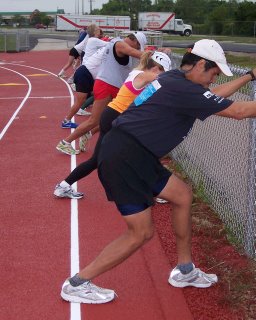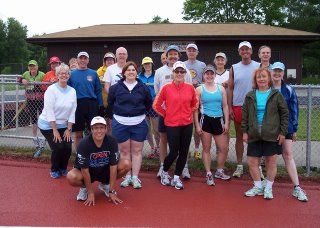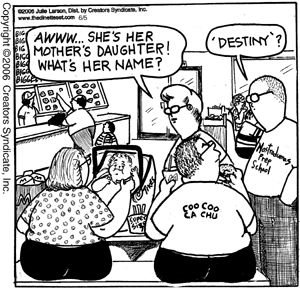ollieacompulsiveovereater
This is my online journal of Recovery from Compulsive Overeating. This blog is a personal tool and is in no way affiliated with any established recovery group.- Overeaters Anonymous What OA is about, finding a meeting, getting literature, etc.
- Heart of Texas Overeaters Anonymous Overeaters Anonymous near Austin, TX
- Online Big Book
- Greysheeter's Anonymous
- Food Addicts Anonymous
- Food Addicts in Recovery Anonymous
- Peoria Overeaters Anonymous
Some links which I have found useful; I am not representing any of these groups.
Thursday, June 22, 2006
Food has been fine, though I need a bit more structure at buffets.
What I am struggling with is making wise use of unstructured time; I always do better when there is some routine to discipline me.
Friday, June 16, 2006


Things have gone well so far; I've been consistently at 195 in the mornings this week. The tide seems to have turned, which is nice since I am not working out that much.
In the above photos I am wearing the white longhorn hat and the black shirt and shorts; I am first in line in the top photo and squatting down in front (doing a "frog" stretch) in the second photo.
Yes, I do talk about weight and food, but for me that is a huge part of it. I don't want to be sitting in the rooms, patting my ponderous belly as I babble on with clever stories or windy philosophy.
Tuesday, June 13, 2006
http://www.webmd.com/content/article/121/114065.htm. The article reads:
Most Americans See Excess Pounds on Others but Not Themselves
| |
Really? I guess that "denial" isn't just a river in Egypt any more!April 12, 2006 -- Most Americans see a serious weight problem among other Americans but often can't see it in themselves.
So says a new survey from the Pew Research Center. The survey, done by telephone in February and early March, included 2,250 randomly chosen U.S. adults.
The survey showed widespread agreement that the U.S. is heftier than it should be. But most participants thought those extra pounds were on other people's bodies.
Among poll takers, 90% said most Americans are overweight. A smaller group -- 70% -- said most people they know are overweight. Even fewer -- 39% -- called themselves overweight.
Participants mainly blamed insufficient exercise for America's weight problem, followed by lack of willpower about what to eat, the survey also shows.
The article continues:
When asked if Americans are more overweight than five years ago, 85% of poll takers said yes, and two-thirds called that trend a "major problem."
The CDC recently reported that . But in the Pew survey, less than four in 10 thought they were overweight, showing a gap between perception and reality. [...]
Both polls showed that among people who had ever dieted, about 75% reported losing at least 5 pounds and keeping that weight off for at least a year. In other words, dieting may have been more common 15 years ago, but people weren't much better at it then.
"Nearly everyone -- dieters and nondieters alike -- say that is difficult to lose weight," the new poll states. For instance, 59% said it is "very hard" for people who are very overweight to lose weight. Women, people aged 50 and older, overweight people, and dieters were more likely to agree that weight loss is very hard for the very overweight.
Exercise a Big Issue
Why are so many people in the U.S. overweight? Insufficient exercise is the biggest reason, the poll shows.
Again, this "reason" just comes from the polls. I suppose this is part of the "well, most people are average but I am above average attitude that I see so often in many walks of life.
I also remember that when I lost a great deal of weight, I saw myself as being slimmer than I actually was.
Monday, June 12, 2006
The clinic might be described as a Step 10 for my walking. When I walk I feel that I am walking well; the cold blooded video analysis shows differently.
Next, my temptation is to rush out and buy a digital video camera, new fancy shoes, etc. These latter things might help but only if I follow through by using them.
Same thing with recovery stuff: if I go to events and then don't follow up, I've wasted my time.
Scale: 195.5 this morning; it appears that I am back down near the top of my upper range.
Wednesday, June 07, 2006
He was right of course, and from then on I've tried to mention food and my struggles with it and freedom from it.
Last night, "guilt and shame" was the topic. And, as is the style these days, "shame" took a beating. But you know what? It was shame that lead me to seek out help! Shame isn't all bad and I think it is foolish to try to eliminate it entirely.
Note that I am not talking about inappropriate shame (e. g., a victim of a crime being ashamed, etc.) Mental health professionals have much to offer in many cases.
But appropriate shame, like pain, has its place.
Tuesday, June 06, 2006
Nevertheless, I am glad that I did the race.
I drove back from Minneapolis on Monday and made it in time for a 5:30 meeting. The contrast between the members of a compulsive overeaters meeting and the group of ultra runners/walkers that I had just been with was very stark, at least in physical terms.
It is no secret that the better ultra athletes are slender, and those who finish 100 miles are almost always skinny. I am usually one of the heavier ones (at least in the three times I finished 100 miles). The body types at a support group for overeaters are 180 degrees opposite on the body fat scale.
As far as who shows up and sticks with it long term: typically, the "success" stories are those who were, at one time, somewhere between moderately and morbidly obese who have lost, say, 1/2 to 2/3'rd of their excess weight and have kept it off (say, a former 300 pound woman who now is between 180 and 190 pounds and has stayed that way for a couple of years). Statistically speaking, these types have done themselves a great favor, as the health risks from obesity skyrocket as one passes from being moderately to morbidly obese.
Nevertheless, that isn't all of what I want out of the program. But if I don't go to these meetings, my days of doing ultras will be long gone.
These meetings keep the old tapes "hey, you walked X miles therefore you deserve to eat W, Y and Z" silent.
Monday, June 05, 2006

I am getting ready to head back to Peoria from Minneapolis.
Take a look at the picture to the side; notice the people in the background including those at the counter. There is also one person who isn't overweight; can you spot him (or her)?
This leads to another issue I have: I don't like fat people, or rather I have a bias against them.
No, I don't think that fat people are stupid, etc., and I wouldn't dream of considering a person's weight if they were, say, looking for a job. What I mean is that I don't like being around groups of fat people, especially when they are around food. That lends itself to a problem because many of my relatives, both "blood" relatives and "in-laws", are obese. Unfortunately, some are very young and obese.
But, as someone told me: "it isn't contageous and, if it (the propensity to overeat) were contageous, you already have it."
Now what explains my attraction toward extreme sports like ultramarathons? This article might provide a clue:
http://news.yahoo.com/s/space/20060605/sc_space/menwhocantplaydrink
LiveScience Staff
LiveScience.comSun Jun 4, 10:00 PM ET
Here's a shocker: "Men who are not confident in their sporting abilities may try and make up for this by drinking excessively."
So says Richard de Visser, whose new study looked into the masculine behaviors of young men in London and how it all affects their health.
The University of Sussex researcher did in-depth interviews with 31 men age 18-21, concluding that they commonly use one type of typically masculine behavior to compensate for their inability to perform another.
With the World Cup soccer tournament starting Friday, and his nation's young men expected to down a few extra pints during the televised action from Germany, de Visser thinks understanding the findings could improve health education.
The message: Play ball!
The results "may be able to have an impact on the growing levels of anti-social behavior such as binge-drinking, violence and illicit drug-use," de Visser said Sunday. "Young men could be encouraged to develop a competence in a healthy typically male area—such as football—to resist social pressures to engage in unhealthy masculine behaviors."
The study, funded by the UK's Economic and Social Research Council, will be published later this year in Psychology and Health and the Journal of Health Psychology.
Of course, I bore the burden of those 10 extra pounds or so; it will take time for these to come off.
No, I am not doing the compulsive weight reduction diet type thing, but I also know that regaining 130-135 pounds starts with gaining the first 10.
How else did food factor in? Well, at 12:38 (tweleve hours, 38 minutes) I was at 50 miles and ate one slice of pizza for my meal (every 4 hours). I decided to eat a second slice 38 minutes later (I give myself 1 hour to finish my meal). The second slice was a disaster as it didn't digest; it made me sick.
The first slice really worked as the fat in it helped me pick up the pace. But pizza is hard to digest, especially when I am working hard for a sustained period.
So, this was the old "if one is great, two is even better" type of thinking.
The good news is that I didn't quit and 4 hours later (after not being able to hold anything; not even water) my last "meal" perked me right up.
Thursday, June 01, 2006
I do ultramarathons and have to alter my plan of eating. I never eat non-abstinent food, but I go on a "meal time every 4 hours" with a juice/protien bar (sugar free) snack every 2 hours or so if the stomach can handle it.
This time I might try the juice every 2 hours, meal every 4.
Weight is 196.5 (home scale).
Archives
May 2006 June 2006 July 2006 July 2007
| Dual Drill |